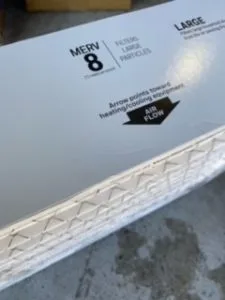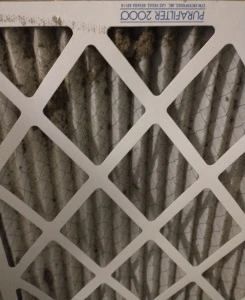Keep Your HVAC Efficient with Regular Furnace Filter Changes
How Often Should My Furnace Filter Be Changed?
If you own an HVAC system in your home, operate a system as part of a rental, or even are a renter living in a home with an HVAC system, you probably want to make sure that it’s being properly maintained. Proper maintenance can reduce system wear and decrease the number of repairs the system will need over its lifetime. The most basic form of maintenance is changing the filter in your furnace. So how often should your furnace filter be changed?
This process is simple and quick but often overlooked. Many of the new homeowners I’ve talked to have said that they “didn’t know they had an air filter until they talked to their HVAC guy.” Yes, that is an exact quote.
What Decides How Often a Furnace Filter Should Be Changed?
The answer, like most things, varies. The variable that has the biggest impact on how often you need to change your filter is the size. Filters come in a range of thicknesses. The most common filters are 1, 2, and 4 inches. On rare occasions, a 5-inch filter is used for a single residence. You can find larger filters in commercial HVAC systems, in which case the company that installed that system will provide instructions for maintenance.
Another factor that can influence the lifespan of your filter is the MERV rating. If you don’t know what a MERV rating is, we talk about it in our best filters for allergies post. You might find that certain MERV ratings are more common in certain sizes. This is done to improve airflow in higher MERV filters. So MERV rating and size don’t always correlate.
Of course, being told that “it depends” isn’t really a satisfying answer. Let’s break it down and see how both factors can influence an air filter’s lifespan.
Size Affects How Often Your Furnace Filter Should Be Changed
As we stated earlier, the thing that will have the biggest effect on how often you need to change the filter is the size. For this part, you can mostly disregard the length and width. What you need to look at is the thickness.
If you’re not sure what the thickness of your filter is, it is usually easy to check. The company that installed your HVAC system may have labeled the furnace with the size of the filter used. If not, the filter’s size should be printed on its side or on its face. The thickness is the third number of the dimensions.

1-Inches or 2-Inches Thick
This is the most common filter thickness in single-family residences. This filter size has the shortest lifespan. Most manufacturers recommend that this size of filter be changed out once every 90 days.
4-Inches Thick
This is still a very common size for air filters. Typically, your higher MERV filters are going to be around this thickness. This filter is recommended to be replaced once every 6 months.
5-Inches Thick
This type of filter is rarely seen. This size is usually reserved for very high-efficiency air filters. If you have a MERV 16 or HEPA filter, you might have a filter that is this thick in your system. The recommended frequency to change these filters is once every year.
MERV Rating Affects How Often Your Furnace Filter Should Be Changed
The MERV rating can also affect how often you need to change your filter. Typically, air filters are going to be made in such a way that higher MERV filters are thicker. Again, this is done to improve airflow through the filter. A high MERV filter is going to catch a lot of particulates that would travel through a less efficient filter. It’s going to be woven tighter and restrict airflow a lot more.
By making the filter bigger, it can allow more airflow while still efficiently filtering. To reiterate an earlier point, this is a design choice and does not have an exact correlation. For example, you could buy a 1-inch thick MERV 14 filter or a 4-inch thick MERV 12 filter.

While a high-efficiency filter in a clean system in a clean home may have a long life span, it is recommended that you primarily decide based on the thickness of the filter. The following recommendations are taken from manufacturers to add additional context to that decision.
To know what MERV rating, you currently have in your systems, you just need to check the label on the filter itself. The MERV rating could be listed on the side or front label depending on the brand.
Up to MERV 8
This is the recommended bare minimum for home HVAC systems. A MERV 8 filter is going to reduce a majority of pollutants but does not catch the smaller pollutants and allergens that could circulate in your air. It is recommended that this kind of filter be replaced every 90 days.
MERV 9 - 12
Anything between MERV 9 and 12 is what you might see in a standard home HVAC system. These are efficient filters (meaning they filter a lot of bad stuff) that still allow a decent chunk of airflow through the system. These filters are recommended to be replaced once every 6 months.
MERV 13 - 16
Filters that have a MERV rating of 13 or higher are very efficient. The MERV scale stops at 16 so this is the most efficient you can get outside of a HEPA filter. These filters have a lot of stopping power so they will catch the most amount of pollutants and allergens in your HVAC system. These filters are recommended to be changed every year.
HEPA
If you have a HEPA filter, your filter is so efficient that it stops particles as small as 0.3 microns. These filter manufacturers might have their own recommended replacement timelines. Typically, we find they use the same timeline as if you were to go off size.
How Do I Know It’s Time For My Furnace Filter to Be Changed?
If you lost track of when you installed your current filter or if you think your filter may have expired early, there are a few signs to look for.
- The filter is visibly dirty
- Your home is abnormally dusty, especially around your vents
- You notice your HVAC system running more frequently and longer than normal
- Strange smells coming from your vents or the smell of burning near your furnace

That first bullet was highlighted because it is absolutely crucial that a filter be changed when it is visibly dirty. If it looks like it has built up a layer of dust or grime, it needs to be replaced. A filter may need to be changed more frequently than what is typically recommended if a home is dirty or if there has been a recent change that has dumped a ton of dust, debris, or pollutants into the ducts. Consider checking your air filter if you recently had a renovation, a heavy storm, or have noticed your home’s interior is very dirty.
Effects of Dirty Filters
These symptoms could indicate that your filter is blocking airflow. If there is substantial build-up on the filter, it cannot catch dust and pollutants, allowing them to circulate in your home. It could also diminish the airflow of your system. That means it’ll take your system longer to achieve the desired temperature and it may not maintain that temperature. It is also possible to smell that build-up and the additional strain on your furnace and air conditioner. This could burn out the coils or freeze over the AC unit.
Who Are Advantage Heating and Air Conditioning, LLC?
We are your local HVAC Experts out of Salem, Oregon. We hope this article has given you the information you need to know how often your furnace filter should be changed. If you have other questions about HVAC systems, check out our other blogs. To learn more about who we are and how we can help you, visit our website and follow us on social media – we’re here when you need us!
Some Others Services including:







